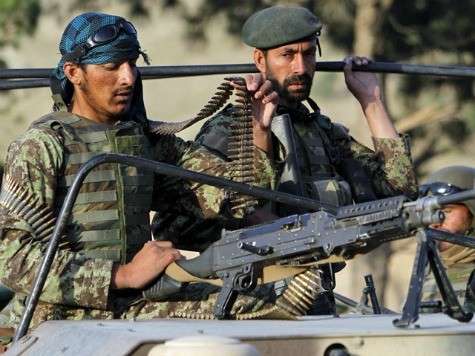The second-ranking U.S. military commander in Afghanistan said on January 23 that Afghan forces overmatched the insurgency during the last fighting season, adding that the Taliban is on the “edge of strategic defeat.”
However, speaking live from Afghanistan, U.S. Army Lt. Gen. Mark Milley, commander of the U.S./NATO-led International Security Assistance Force (ISAF) Joint Command (IJC), told Pentagon reporters that there is more to be done.
“We have got to continue to build the institutions to ensure that this [Afghan] security force can continue to stand on their own,” he said, “and then that security force provides the shield to buy the time and space for the rest of the society to develop in health, in education, in government, in economics and so on and so forth.”
“That’s the fundamental premise in order to stabilize this place and prevent it from ever again becoming a haven for terrorists who attack the United States and I think it can work,” continued Lt. Gen. Milley. “I think it is working.”
He said Afghan forces, now in the lead of security in their country, bore the brunt of military fatalities during the 2013 fighting season.The fighting season occurs in the Afghanistan summer months of June to September.
Taliban militants “lost the fight in the summer of 2013 and the ANSF [Afghan National Security Force] acquitted themselves extraordinarily well,” added Lt. Gen. Milley.
The ANSF includes the Afghan National Army (ANA) and the Afghan National Police (ANP).
“Strategically, the tide of the war is not with the Taliban and their fellow travelers,” he also said, adding that the Taliban knows “they are on the edge of strategic defeat.”
During the 2013 fighting season, “the Afghan security forces were tactically overmatching anything that the Taliban, Haqqani [network], or anybody else can throw at them and they performed extraordinarily well and they didn’t do that with a whole lot of ISAF or international help,” said the commander. “They had some, we provided that over the summer, but for the most part the Afghans carried the heavy load throughout the summer and I think that’s enormously significant.”
Lt. Gen. Milley said he is confident ISAF will continue to train, advise, and assist the Afghan forces beyond 2014.
The commander warned that the Taliban intends to disrupt the April 2014 elections in Afghanistan, prevent a Bilateral Security Agreement (BSA) between Kabul and Washington, and prevent a NATO Status of Forces Agreement (SOFA) from being reached.
“If a BSA and a NATO SOFA and an election happens that’s generally acceptable to the people of Afghanistan, the Taliban [will] have taken a very mortal blow,” added Milley.
According to the commander, the Afghan combat forces are capable of securing the country independently or with very little support from U.S.-led forces.
The Afghan combat units “really do not need, with very few exceptions, tactical advisors with them on combat operations on a day in day out basis. We know that the Afghan battalions can fight. We know they can shoot, move, communicate,” Milley said.
He said that the Taliban has lost popularity and credibility in Afghanistan.
“It was clear throughout this summer because of the murdering and suicide bombings and terrorism that the Taliban conducted that their popularity, if you will, declined,” said Lt. Gen. Milley.
“The Taliban have very, very little credibility throughout the country from a political standpoint,” he later added.
He pointed out that the strategic goal of the Taliban and its affiliates in Afghanistan is to retake political power, adding that they largely are losing on that front.
“About 80 percent or more of the landmass and 80 percent of the people were actually secured during this last summer fighting season with the ANSF,” he said.
U.S. military officials have proposed keeping a residual force of 10,000 soldiers in Afghanistan post-2014.
However, Afghanistan president Hamid Karzai has refused to sign a bilateral security agreement between Kabul and Washington that will pave the way for U.S. military presence in Afghanistan after 2014 when the U.S./NATO-led mission ends.
The White House has said that without a security pact, it will be forced to withdraw all U.S. forces from Afghanistan.

COMMENTS
Please let us know if you're having issues with commenting.